While Donald Trump is putting up walls, others are knocking them down. Azniv Korkejian alias Bedouine builds bridges between Aleppo and LA in balmy folk songs that fit perfectly in the plush atmosphere of the AB Salon.
"My mom always had Bedouin jewellery hanging around the house,” Azniv Korkejian explains her alias on the phone from Madrid. That house was initially located in Aleppo, where her Armenian family ended up after the genocide at the beginning of the last century. But they soon moved to Saudi Arabia, where Korkejian spent her pre-teen years in a walled community. After her parents won a Green Card Lottery, they departed for the USA. They first arrived in Boston and then moved to Houston.
Their daughter peregrinated to Kentucky, Austin, and Georgia, where she studied sound design, but she eventually settled in LA. Over the past few years, the 32-year-old singer and guitar player let her silken folk songs ripen at her flat in the hip neighbourhood of Echo Park. Last year, they were released on her elegant debut, wandering somewhere between Nico and Leonard Cohen, Joni Mitchell and Bobbie Gentry. So the name Bedouine must also refer to her nomadic lifestyle. “Of course. But I also admire the simple lifestyle of the Bedouin. They live outside of a super capitalistic culture and don’t own many things. Their biggest treasures are really just each other’s company.”
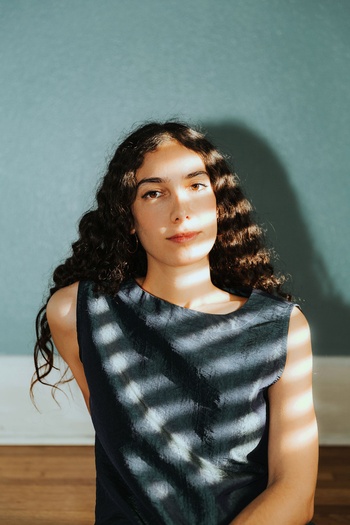
© Polly Antonia Barrowman
“I do with little, don’t need a lot,” you endorse that philosophy in “Back to You”.
AZNIV KORKEJIAN: I’ve always been pretty light on my feet, ready to pack my car and drive to another city when I want to. When I moved to LA, I bought some furniture and that was a pretty big step for me. I’m very frugal, I always feel guilty when I spend money on something I don’t need. [Laughs] I also like buying second-hand clothing and used things, there’s already so much garbage and plastic in the world.
In that same song, you describe California city parks that talk in “exclamation marks”. Do you feel comfortable in LA?
KORKEJIAN: That song is my love-hate letter to California. I love living there, but it’s not always easy to get a little deeper with people in LA. Everything seems to be focused around being healthy and being positive. When I wrote that song, I was finding it hard to live somewhere that was always so bubbly.
Was it a big step to move from a gated residence to a country where freedom knows no bounds?
KORKEJIAN: I was just ten years old, but I remember that I was confused. Suddenly I was in a neighbourhood where I could walk on and on and on. I found that intimidating. How do I know where to stop? [Laughs]
Culturally, the change wasn’t so big. In Saudi Arabia, my brothers and I went to an American school. And we lived in a compound where a lot of Americans stayed. It took a couple of big circumstances to really understand that there was a difference between that walled community and the world outside. One time my brothers and I went to the mall to go ice skating. It turned out that I wasn’t allowed to skate because I was a girl. That was very upsetting. I started plotting all the ways that I could pretend I was a boy, like hiding my long hair. [Laughs] Anyway, with my brothers I always felt like a tomboy.
It took me a while to enjoy living in the US because as a ten-year-old, you have a lot of conceptions that you don’t want to change. It’s hard to leave all your friends and everything you were familiar with behind.
When I moved to LA, I bought some furniture and that was a pretty big step for me
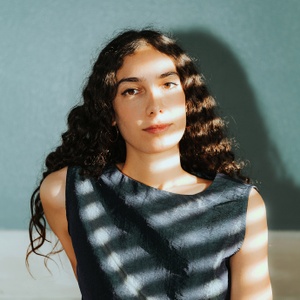
When I listen to your music, I would swear you had grown up with the folkies of Laurel Canyon.
KORKEJIAN: Yeah, totally. My parents listened to Armenian and Arabic music, but I liked MTV and the music of Mariah Carey and Boyz II Men. [Chuckles] Connecting to folk music from the 1960s and ’70s happened when I was in my twenties, in America. That music spoke to me because it is so honest and simple. It felt like the most direct and compelling way to tell what your truth is.
You referred to singers like the German folk singer Sibylle Baier as an inspiration. Her songs are very sparse, while yours are lush.
KORKEJIAN: I approached [bassist and producer] Gus Seyffert to record some of my songs to tape, and through him I got in contact with Matthew E. White from Spacebomb Records. He suggested to flesh out my recordings with his Spacebomb House Band. The songs still had so much room that we thought it was worth a try, and, yeah, it ended up working really well.
You sing about love and about living in the US. But in the song “Summer Cold”, you refer to your youth in Aleppo using street sounds.
KORKEJIAN: We moved almost immediately after I was born in Aleppo. But we often went back to visit my family. The typical sounds and smells of the street kept reverberating in my head for years. It bothered me that I couldn’t go back and have that experience. Recreating those sounds was a kind of therapeutic thing for me.
Aleppo was our home base, a beautiful, vibrant city where we would go to catch up. We would go every year, until the war broke out. The last time I was there was in 2009. It was of course devastating to see this place being destroyed, but the city has become a bit steadier now. My parents went just a couple of months ago. We still have family there.
On the deluxe edition of your record there’s a bonus track, “Louise”, sung in another language.
KORKEJIAN: That’s Armenian. I speak it like my parents speak English, it’s not perfect. [Laughs] It’s a song about people in war-torn countries, how they decide whether they should stay or flee. I first imagined that you would absolutely want to leave in a situation like that, but I gradually started realizing that you can’t just leave your home and belongings and your friends and family.
“Louise” means “light” in Armenian. It ended up being quite an optimistic song about making decisions for yourself. Thousands of people fled Armenia during the genocide in 1915, and many of them ended up in Syria. Because of the war, many of them have now returned to Armenia. They’ve come full circle.
“I don’t want your pity, concern, or your scorn, I’m calm by my lonesome, I feel right at home,” you sing in “Solitary Daughter”. Has crossing all these geographical, cultural, and religious borders made you more self-reliant?
KORKEJIAN: I think so. It’s still up to you to study and read, and question sources, and just keep an open mind. I’m kind of a...mutt. [Laughs] I grew up in the Middle East, but I had a very Americanized experience. In the rise of what’s happening right now, people tend to forget how similar we are. A lot of songs on the record, come from a sense of detachment and not attaching to any one idea. Everybody has their own ideas and they’re all equally important, they’re all just as truthful as anybody else's.
> Bedouine. 12/6, 20.00 & 21.15, AB Salon

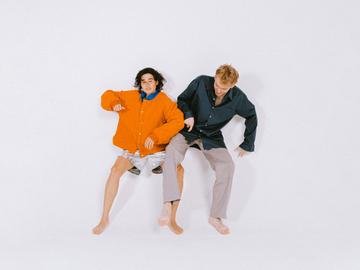
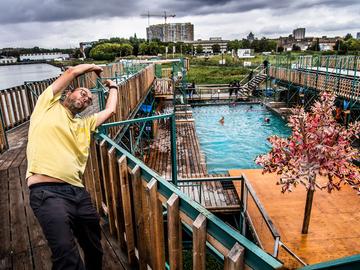
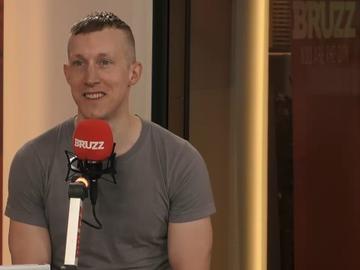
Fijn dat je wil reageren. Wie reageert, gaat akkoord met onze huisregels. Hoe reageren via Disqus? Een woordje uitleg.